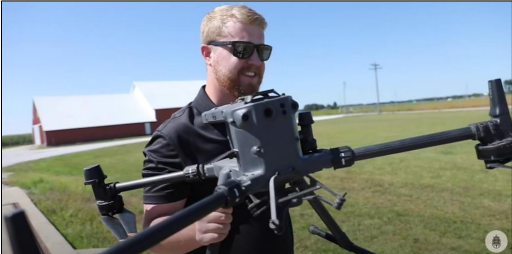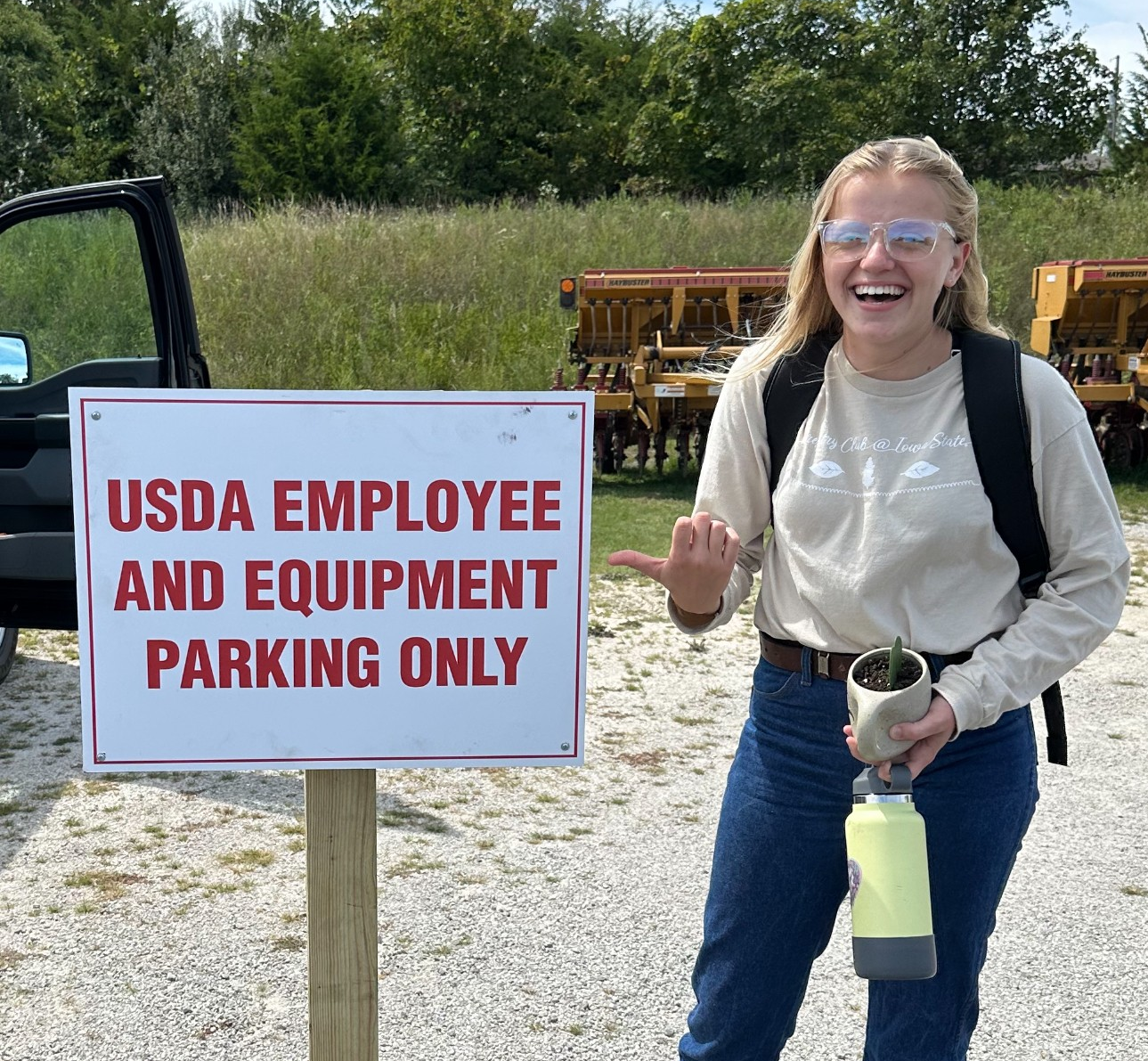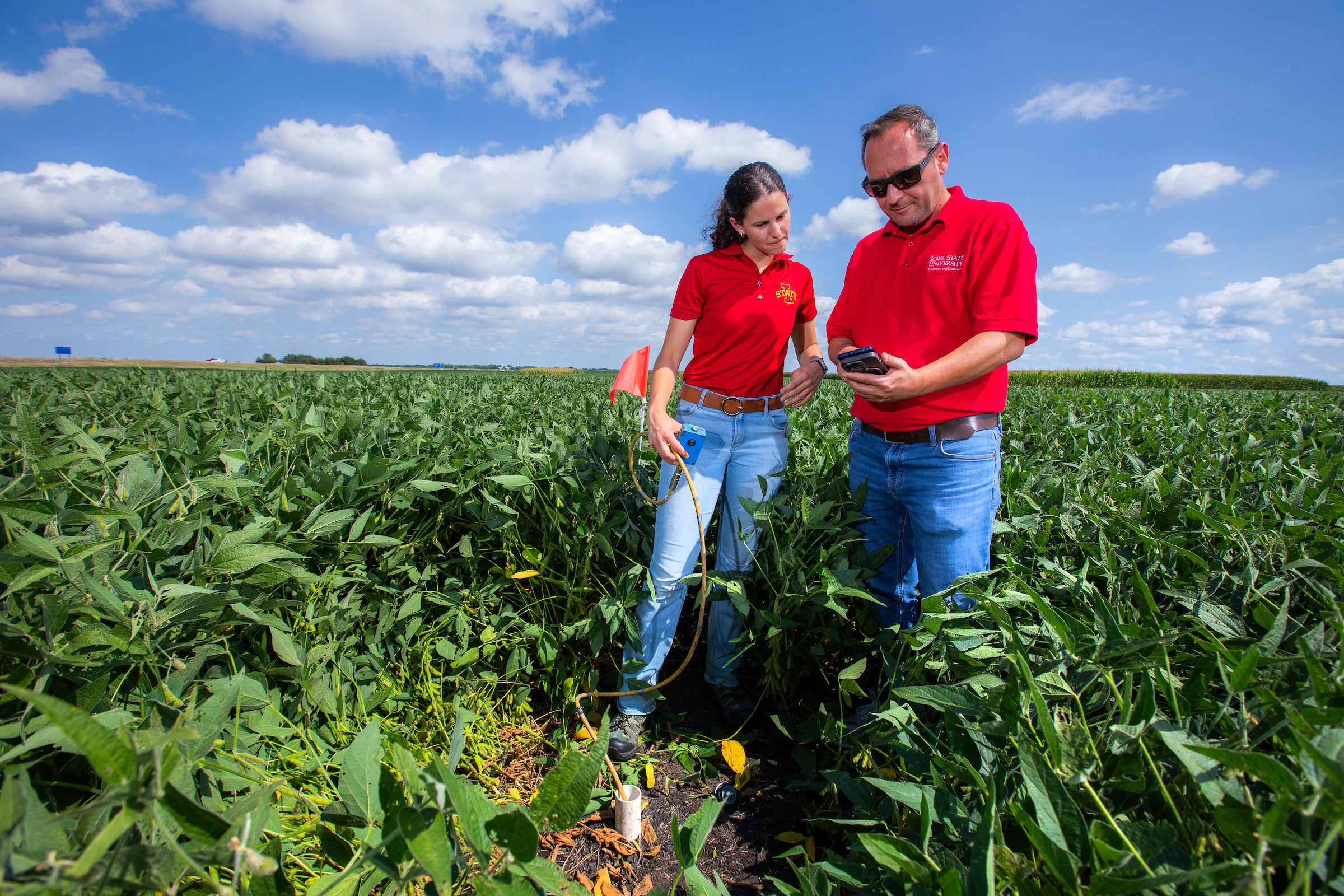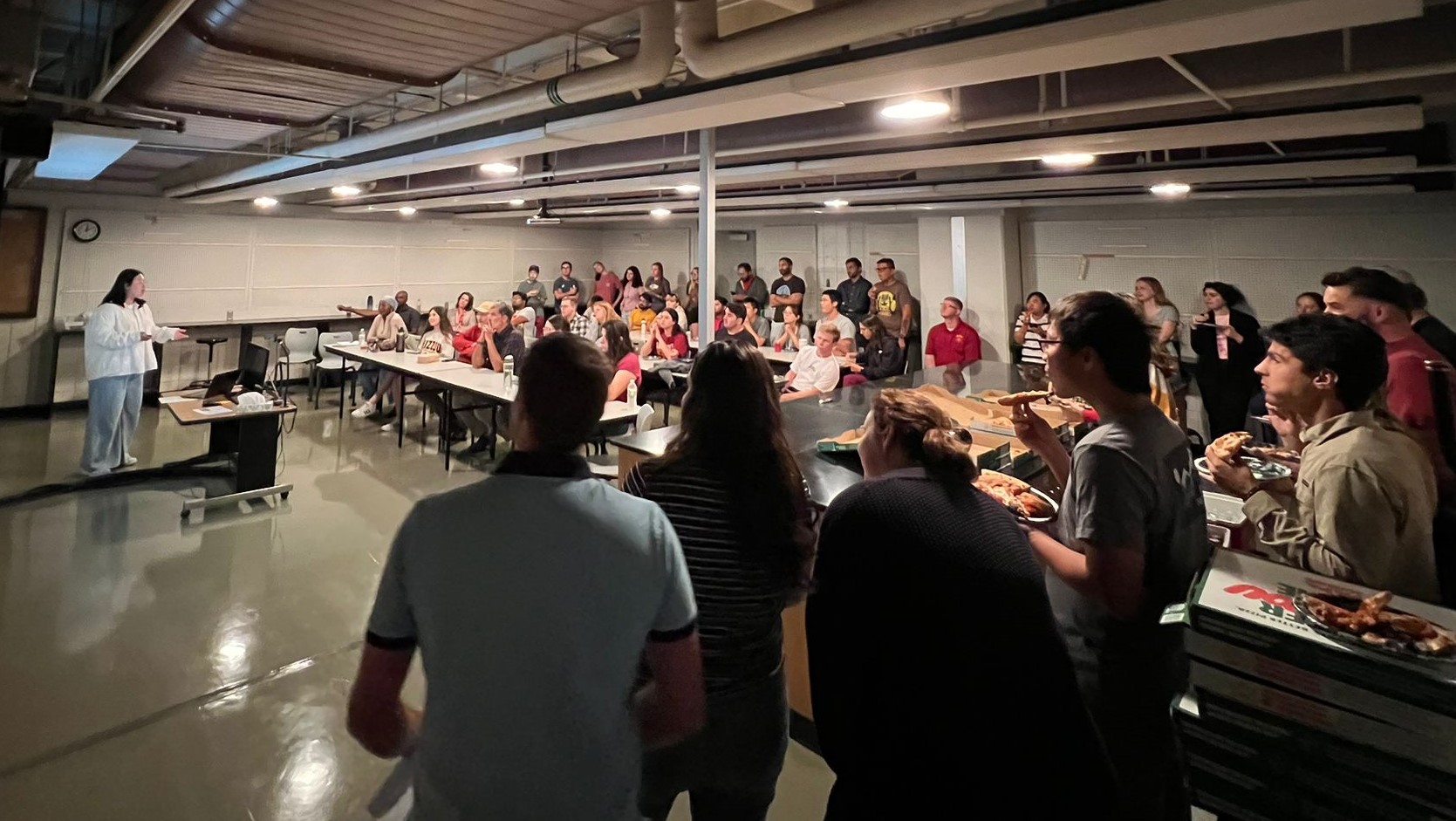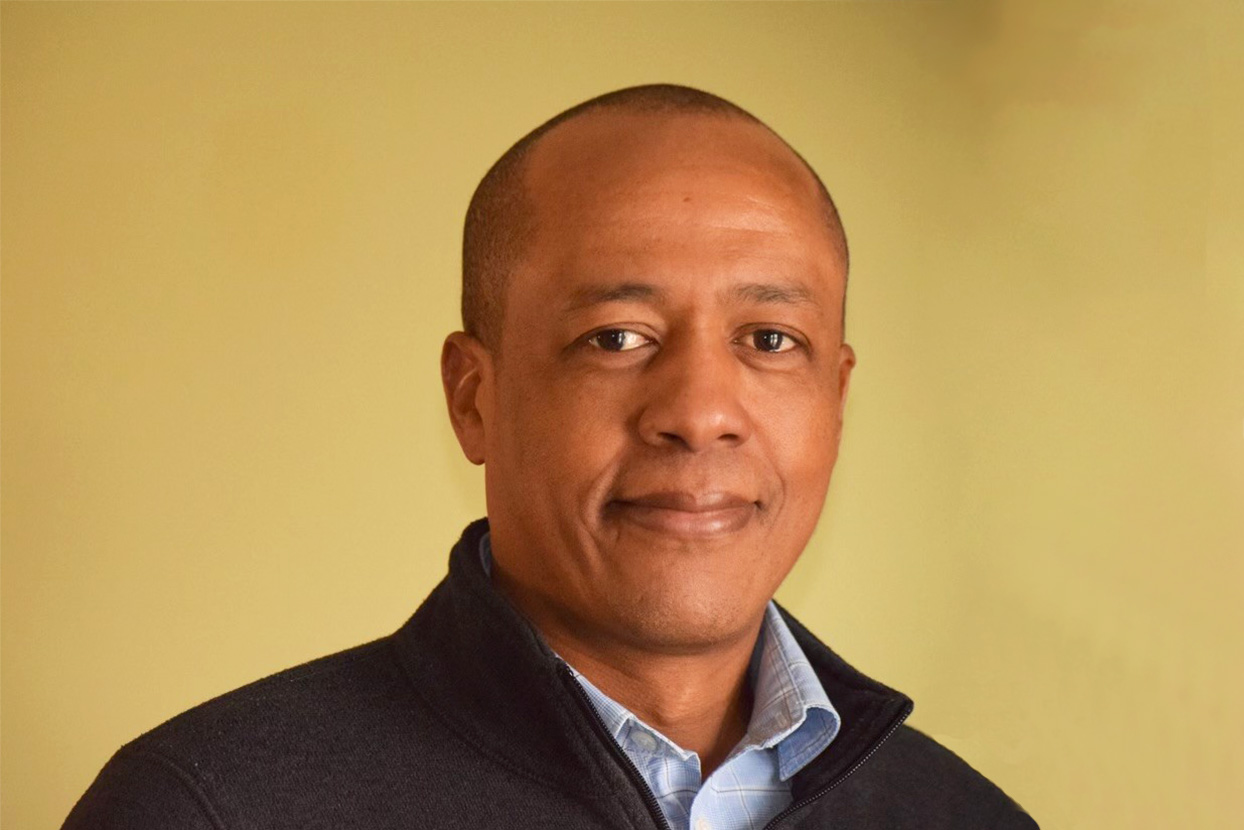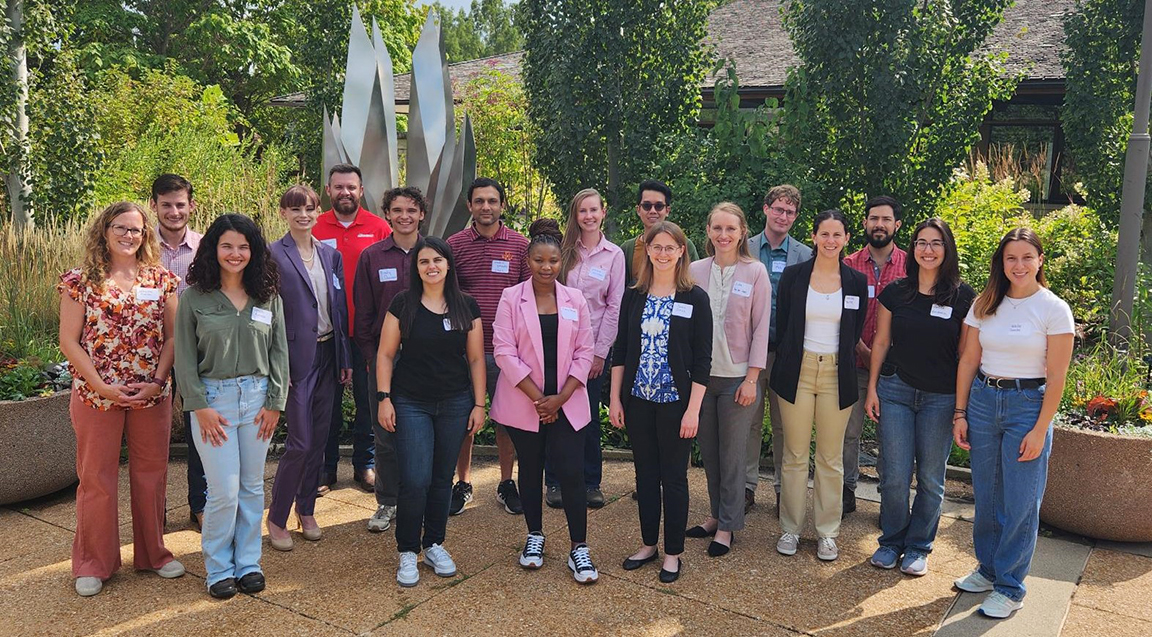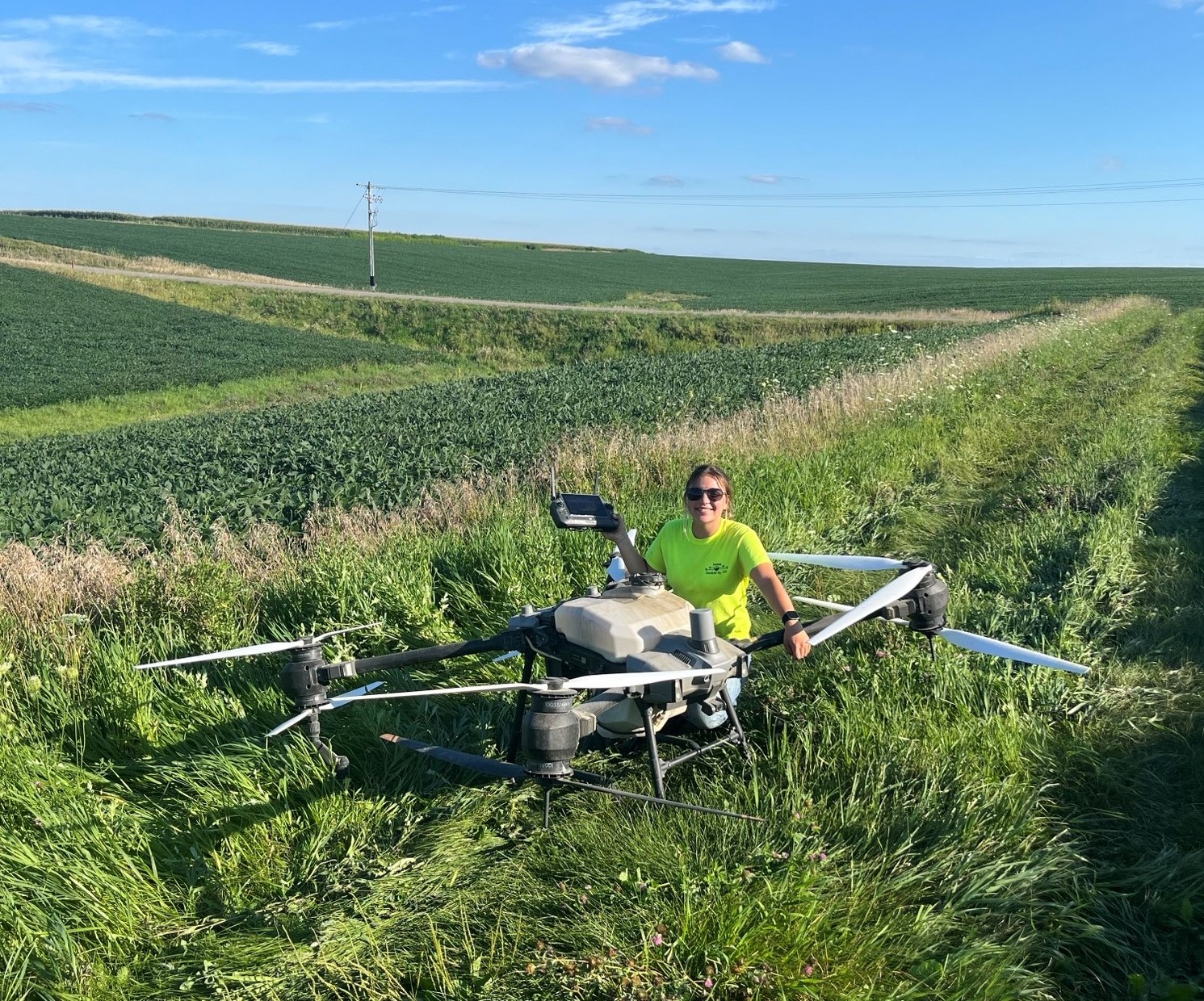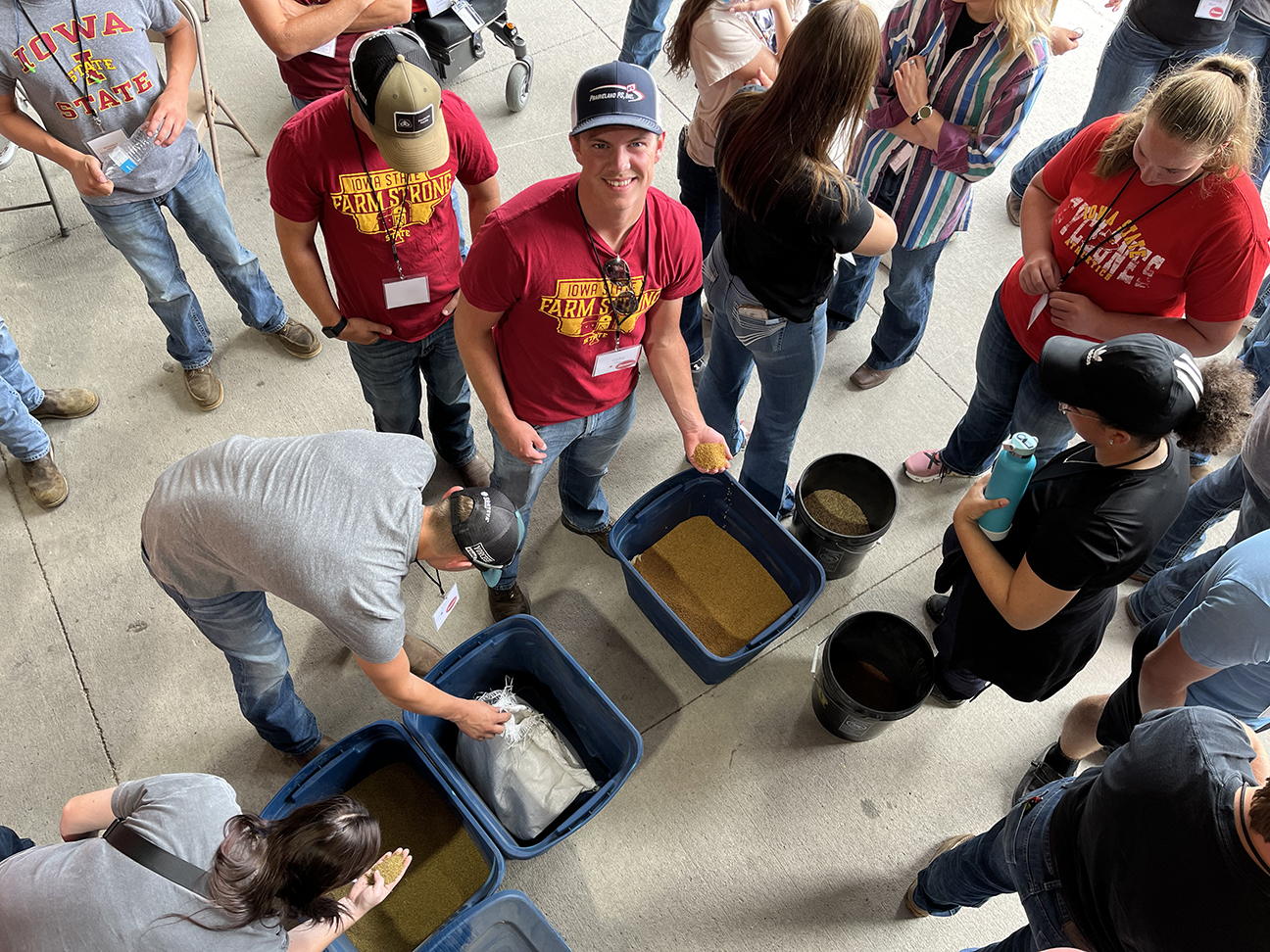Join us from 4-6pm on Tues., Sept. 3, in the Agronomy Hall Commons area for an ice cream social Sponsored by the CARE (Connecting AgRonomists from Everywhere) Committee. Comments from Department of Agronomy Interim Chair Dr. Mary Wiedenhoeft and a representative from the CARES Committee will be at 4:30pm. Faculty, staff, undergraduate and graduate students are welcome!
Drones in Agriculture: MS Student Chris Tonkel
Chris Tonkel, a graduate student in Agronomy, has incorporated drones into his creative component for his graduate degree through the distance learning program. He covers how they are used in agriculture, advantages and disadvantages, protocol and safety, and works for Keystone Cooperative in Indiana. To learn more about this project click here!
Agronomy Student Gains Experience as USDA-NRCS Soil Conservationist Intern
Sabrina Becker is a fourth year agronomy and environmental science student from Stuart, Iowa. Over the summer, she gained valuable experience working as a Student Trainee Soil Conservationist for USDA-NRCS through the Pathways Internship Program. She was stationed in Ozark, Missouri with jurisdiction over five counties. As part of her duties, she met with landowners to develop conservation plans that fall under USDA-NRCS cost-share programs, especially with the Environmental Qualities Incentives Program (EQIP) and the Conservation Reserve Program (CRP). She also worked closely with Missouri USDA-NRCS partners, including the Missouri Department of Conservation and the Soil and Water Conservation District.
Becker said Southern Missouri is primarily rangeland cattle farmers, so she learned about grazing systems and how that relates to soils and water quality. “Within those grazing systems, I learned how to identify many native pasture plants and forage types and how to identify when those forage types can be over or under grazed. Both qualities affect the farmers’ operation and the ecological systems at play within the grazing system,” she said.
One of her biggest key takeaways from the experience was one of perspective. “When you are a rangeland cattle farmer, you are not simply a cattle farmer. You are a forage producer. You must have enough grass, forbs, clover, fescue, etc., on your land for your cattle. The way you manage that land is extremely important economically and ecologically. Like a corn/soy rotation, as you harvest your crop, you take outputs from your system that must be reintroduced. This can be through fertilizers. The same goes for a cattle operation. As your cattle take the forage off the landscape through heavy, intense grazing, inputs must be put back into that system to ensure your perennial or annual forage continues to thrive,” said Becker.
Her favorite part of working in Ozark, Missouri, was the diversity that the area had to offer and seeing the conservation efforts within the National Forests and beautiful rivers. She found her experience rewarding and highly recommends other students take the time to apply through USA Jobs for a pathways internship.
Photo at top: Agronomy student Sabrina Becker finds a parking sign humorous during her internship in Ozark, MO.
Farming soybeans after soybeans, a rarity in Iowa, gets a closer look
In most of Iowa’s fields, three out of every four acres, farmers rotate annually between planting corn and soybeans. Barely any fields see soybeans year after year, a practice discouraged by expert advice and practical experience.
It’s agronomy 101, said Sotirios Archontoulis, an agronomy professor at Iowa State University. Alternating between a cereal such as corn and a legume such as soybeans produces more bountiful yields and helps keep soil healthy. Repeatedly planting the same crop in the same land is like going to a restaurant and ordering steak with a side of steak, he said.
But farmers rely on markets, and sometimes repeated plantings make financial sense. Much of the farmland in Iowa that isn’t in a corn-soybean rotation is continuous corn, typically for economic reasons. And soybean-on-soybean systems are common in some places outside the U.S., such as Argentina.
Though continuously planting soybeans is currently rare in Iowa, it’s easy to imagine more interest developing soon, Archontoulis said. Demand for soybean oil is expected to surge in the coming years to ramp up production of renewable diesel, and the lower input costs for soybeans are appealing when fertilizer prices spike, as they did in 2021. But there’s almost no U.S. research into continuous soybeans, he said.
A project led by Archontoulis is helping change that, running field trials and model simulations to provide data for farmers curious about soybean-on-soybean or continuous soybeans with a winter cover crop of cereal rye.
“It’s not like these systems are going to take over the corn belt. But it’s good for farmers to have more options. Our goal is to determine if this can be profitable and what the consequences are for the environment,” he said.
The project launched in 2023 and is funded by the Iowa Soybean Research Center, an Iowa State collaboration with the Iowa Soybean Association. At two ISU research farms – a site near Sutherland in northwest Iowa and another between Ames and Boone – teams are experimenting with methods for planting and managing continuous soybeans. Variations include soybean-on-soybean planted at different row widths, continuous soybeans with rye cover crop and soybean-rye-soybean treated with manure, along with control plots of corn-soybean and corn-corn.
Weekly drone flights check for crop stress, ground probes bored 8 feet deep measure water tables, sensors monitor soil health and researchers track the prevalence of soybean cyst nematodes. Simulations leverage the data to model expected results over 30 years.
In the first year, the continuous plots were just as productive as rotated control plots. But over time, prior research suggests a yield penalty likely will emerge, Archontoulis said. The size of the penalty is the big question.
“Most farmers want to start the discussion by asking about yield. If it’s a 1% reduction, that’s a discussion that can continue. If it’s 25%, that’s the end of it,” he said.
The project is funded for three years and intends to provide ISU Extension and Outreach field agents with decision-making information to share with farmers. Given the dearth of existing data and the long-term nature of the questions, Archontoulis said he hopes the trials will run well past three years.
“We would like continuous soybeans to be a continuous research project. That’s our vision, to go for many years and to set the foundation,” he said.
Photo at top: Graduate student Carolina Freitas, left, and agronomy professor Sotirios Archontoulis use a probe to measure subsurface moisture in one of their experimental plots of soybeans at the Ag Engineering and Agronomy Research Farm near Boone. Photo by Christopher Gannon/Iowa State University.
By Dave Roepke, ISU News Service: Original article
Agronomists from Around the World
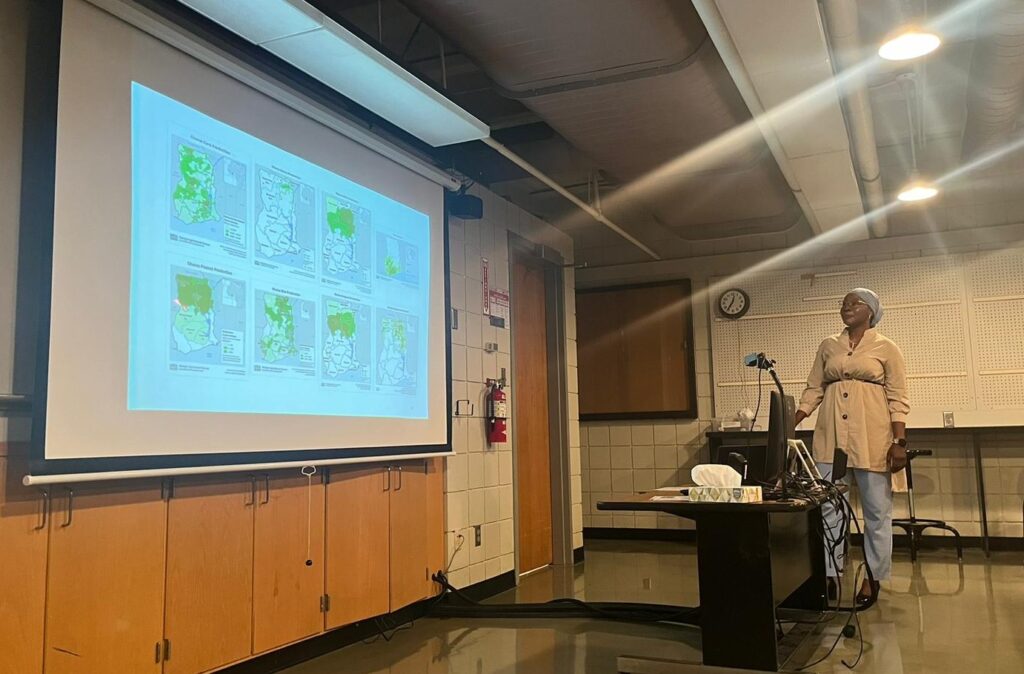
Hyeonji Song of South Korea and Amina Moro of Ghana were the first speakers of the fall semester for the Agronomists from Around the World (AAW) seminar series on Sept. 6. The seminars were started as a way to learn about broad agricultural topics from fellow graduate students. However, undergrads, graduate students, visiting scholars, interns, faculty, and staff are welcome to join one of the most fun and educational activities hosted by the Agronomy Graduate Student Club. The next AAW seminar will be on Sept. 27 with Naresh Venkata Boddepalli of India and Caio Dos Santos of Brazil.
In photo at top: Hyeonji Song presents on South Korea.
Dr. Suza Named to 2024 Top Agri-Food Pioneers List
Dr. Suza was named to the Top Agrifood Pioneers (TAP) List by the World Food Prize Foundation, Emerging Leaders Academy. In honor of the organization’s 38th anniversary, 38 global innovators are being recognized as TAP trailblazers – driving change in agriculture and global food security. This group will form the first cohort of TAP and will be recognized at the 2024 Borlaug Dialogue in Des Moines, Iowa. Dr. Lisa Schulte Moore from NREM was also on the list. Read more
Agronomy Graduate Students/Research Staff Participate in ISRC Research Day
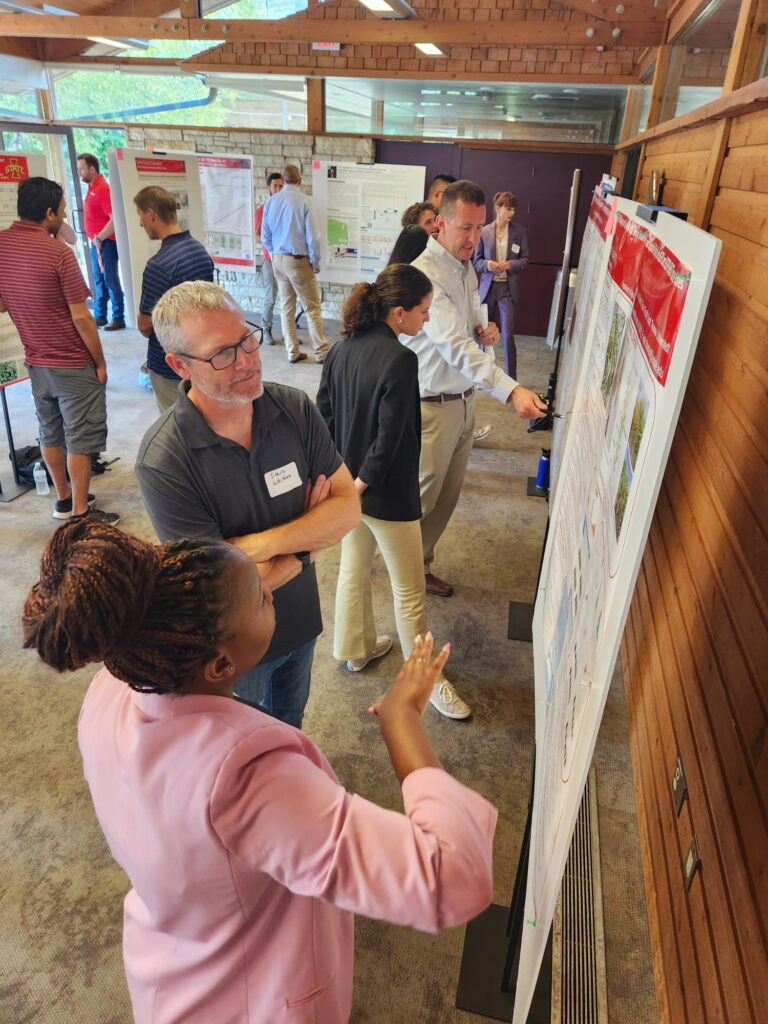
Several agronomy graduate students participated in the Iowa Soybean Research Center’s first ever research day on September 5 at Reiman Gardens. The event was an opportunity to showcase ISU student talent and the variety of research being conducted to 19 different ag industry representatives, farmers and faculty. Several faculty researchers also provided updates on projects that were funded by the ISRC.
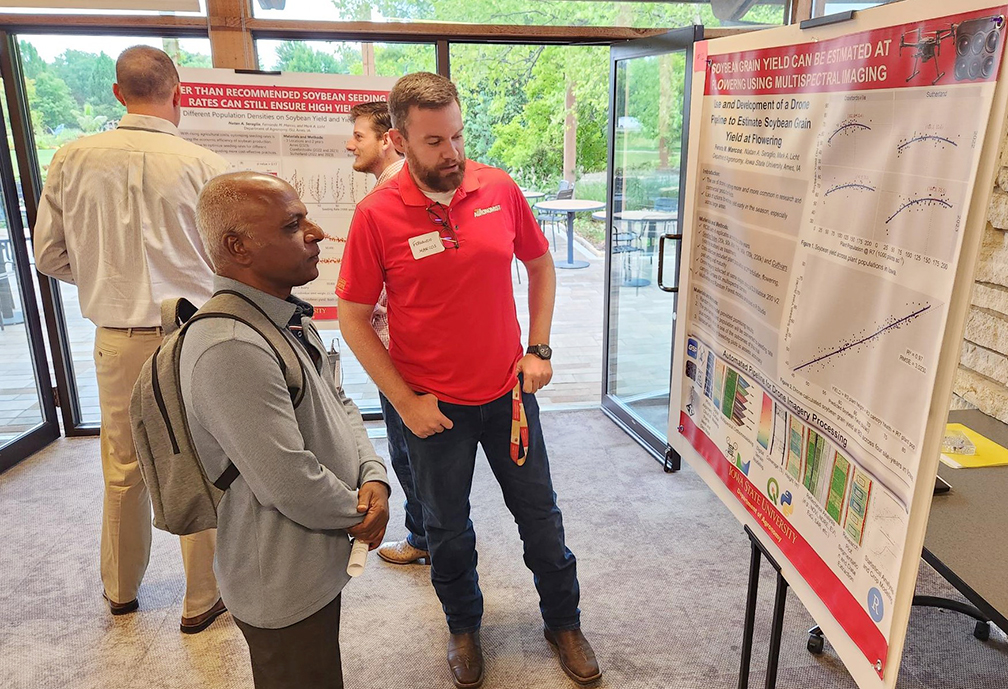
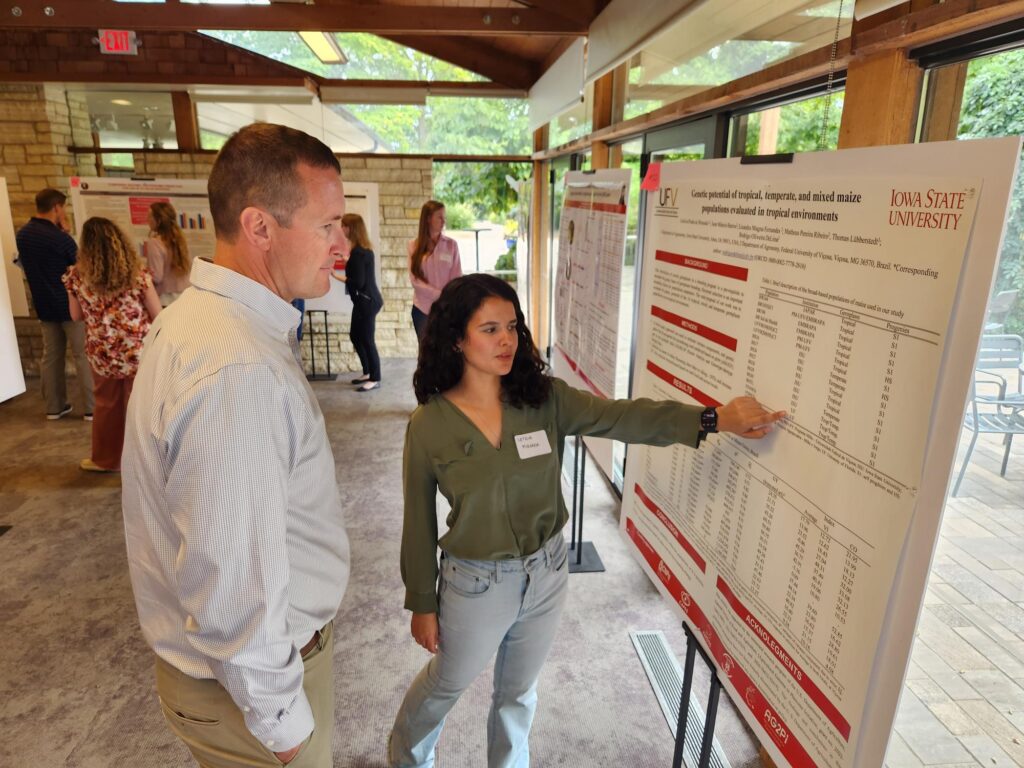
At top, graduate students and research staff that participated in research day. From agronomy, participants included Leticia Prada De Miranda, Mercy Fakude, Carolina Freitas, Liza Van der Laan, Sarah Jones, Natan Seraglio, Fernando Marcos and Naresh Boddepalli.
Agronomy Student Earns Wings during Summer Internship
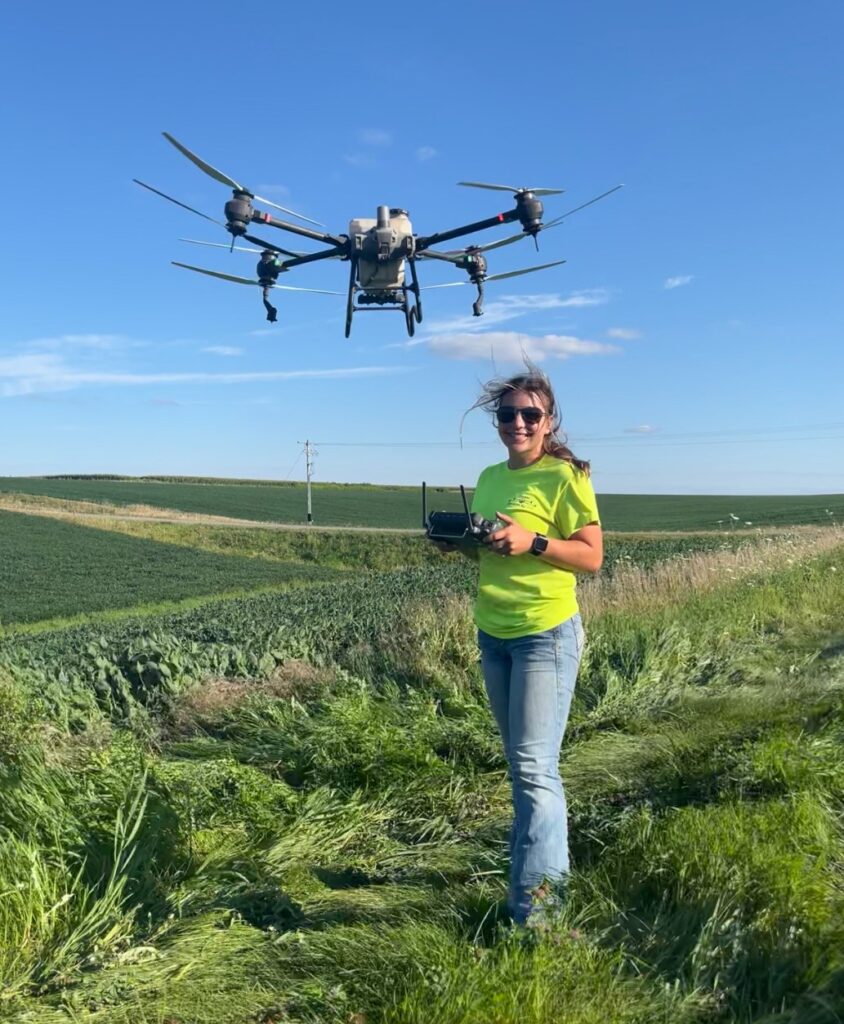
Molly Blum, a sophomore in agronomy from Polo, Illinois, spent her summer working and gaining valuable experience, as well as earning some new credentials during a summer internship with Thomas Elevated Ag in Bellevue, Iowa. A relatively new agricultural service company, Thomas Elevated Ag provides drone applications of chemicals and spreading cover crop seed in large areas of eastern Iowa and northwestern Illinois.
Due to the nature of the internship, Blum had to become a licensed drone pilot. “I had to learn a lot about flight safety, laws, regulations, airspace, etc. I can say I never thought I would be a pilot before this,” said Blum.
She learned to fly three types of drones. “We used a DJI Mavic to map out fields, then sprayed them with either a DJI T40 or an XAG P100. In a typical day, I would take turns with another employee either piloting or filling the drone with product and changing the batteries,” said Blum. “A lot of people don’t realize how big agricultural drones are. The ones I’ve been flying, DJI T40s for example, weigh around 55 lbs. empty, fly at 15 mph and can carry upwards of 250 lbs.”
Agronomy at the Farm Progress Show
On top of a busy first week of classes for the fall semester, many agronomy faculty, staff and students helped at the Iowa State University exhibit at the Farm Progress Show August 27-29. Additionally, others were on hand for interviews and other affiliated responsibilities. Lee Burras, Bradley Miller, Michael Thompson and Mary Tiedeman were part of the soil exhibit; Mark Licht was part of the climate and weather exhibit; Marshall McDaniel and Matt Woods were part of the STRIPS exhibit; and Arti Singh, Danny Singh and several graduate students were part of the AI exhibit. Following are a few photos from the event.



In photo at top, Lee Burras, agronomy, discusses organic carbon.
Agronomy Experts Meet with Visiting Farmers from Brazil
Mark Licht, Sotirios Archontoulis and graduate student Carolina Freitas presented on soybean-related topics during a visit by a group of 40 soybean farmers from Brazil who were here for the Farm Progress Show. Freitas, who is from Brazil, was a big hit as she was able to speak to the group in Portuguese. The group also toured the Seed Science Center with help from Susana Goggi. The Iowa Soybean Research Center assisted the Iowa Soybean Association in coordinating the group’s visit to Iowa State University.



In top photo: Mark Licht, agronomy, welcomes the group of visiting farmers from Brazil.
Agronomy Learning Community Field Trip

Forty-three agronomy freshmen participated in the Agronomy Learning Community field trip August 23-24. On Friday, the group visited Syngenta in Slater to learn about seed corn production and testing and Iowa Cover Crop in Jefferson where students learned about starting a business, on-farm seed production, and the benefits of cover crops. They stayed overnight in Storm Lake at King’s Pointe Resort where students enjoyed the water park.
On Saturday, the students visited an independent crop consultant and his team near Storm Lake where they scouted a cornfield for pest pressures, discussed crop consulting and hot and how different landscapes require different management. Drs. Burras and Hornbuckle spoke about their areas of research and met up with Dr. Kendall Lamkey at the Agronomy Farm near Boone, where he talked about research, Extension and research farm management.
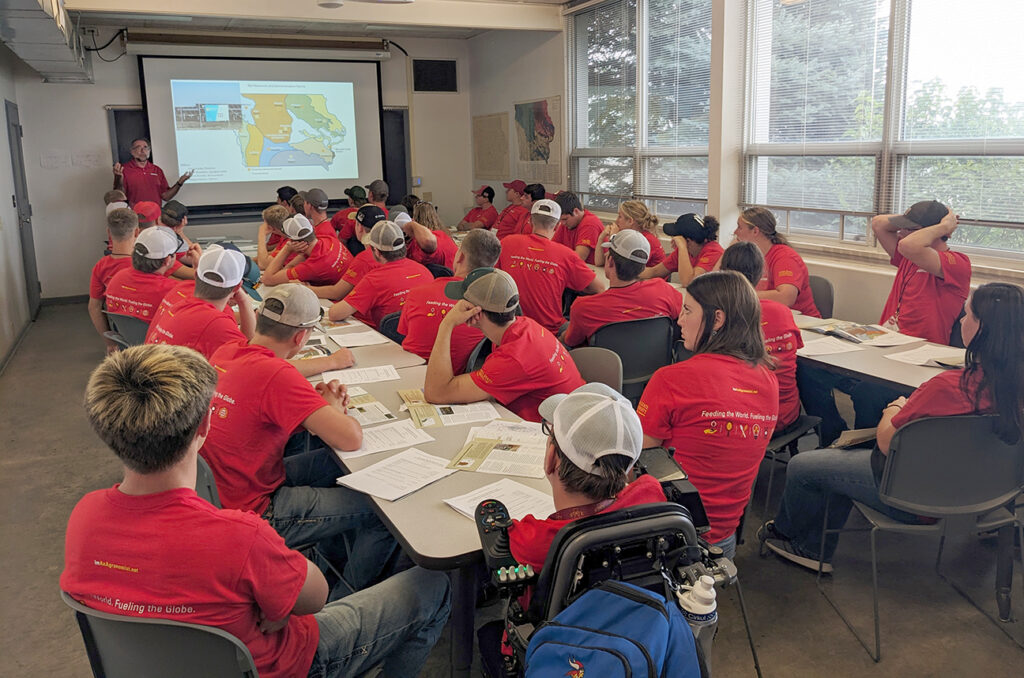
In photo at top: Students learn about cover crops at Iowa Cover Crop in Jefferson.
Students Experience Agron2790: Field Exploration of Agronomy

Agronomy undergraduates recently participated in Agron2790, which led to some hands-on experiences at the AEA Farm and FEEL Lab. Students had the opportunity to fly drones and examine plants with the Singh Lab, they saw equipment from the digital ag group, visited the long-term rotation site with Matt Woods and even spotted tadpoles in a very wet soil pit.
Agron2790 is designed to give students an opportunity to get out in the field and engage in hands-on learning, interact with extension professionals, and see insects, diseases, plants, and soils interacting in the field. After the basics of crop stages, soil features, insects, plant diseases, equipment, weed management, plant genetics, and professional communication skills, students have the opportunity to practice problem-solving, through sample “field calls” like a practicing field agronomist might complete.

At top: December McGrew with a mung bean plant at the AEA Farm.

